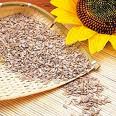- High Quality,lowest prices
- The Direct suppliers which are located in the Origin.
- One of the biggest supplies for Chinese Peanuts and Pumpkin seeds.
Sunflower seeds
In addition, vitamin E plays an important role in the prevention of cardiovascular disease. Vitamin E is one of the main antioxidants found in cholesterol particles and helps prevent free radicals from oxidizing cholesterol. Only after it has been oxidized is cholesterol able to adhere to blood vessel walls and initiate the process of atherosclerosis, which can lead to blocked arteries, heart attack, or stroke. Getting plenty of vitamin E can significantly reduce the risk of developing atherosclerosis. In fact, studies show that people who get a good amount of vitamin E are at a much lower risk of dying of a heart attack than people whose dietary intake of vitamin E is marginal or inadequate. Just a quarter-cup of sunflower seeds contains 90.5% of the daily value for vitamin E.
The sunflower produces grayish-green or black seeds encased in tear-dropped shaped gray or black shells that oftentimes feature black and white stripes. Since these seeds have a very high oil content, they are one of the main sources used to produce polyunsaturated oil. Shelled sunflower seeds have a mild nutty taste and firm, but tender texture. Their taste is oftentimes compared with the Jerusalem artichoke (not to be confused with the bulb artichoke), another member of the Helianthus family.
While not as efficient, another alternative for those who don't have seed mills (which is probably the majority of us) is to put a small amount of seeds into the bowl of an electric mixer, pulsing the mixer on and off a few times for a few seconds each time, until the shells separate but not too many seeds are crushed. Then plunge the seeds into cold water as described above to separate them from the shells. However, shelled sunflower seeds are plentiful in the stores so there is no need to go through the trouble unless you have harvested them from your garden. |


